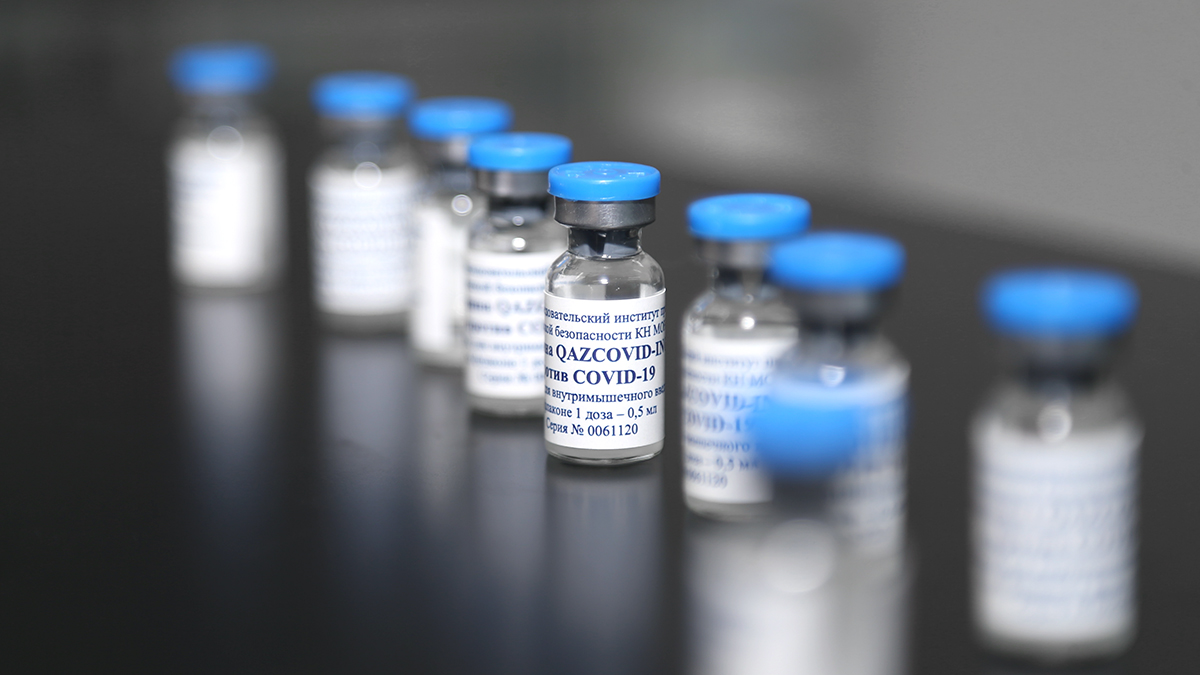NUR-SULTAN – Kazakhstan kicked off its mass vaccination Feb. 1 with Russia’s Sputnik V vaccine, reported Kazakh Healthcare Ministry press service.

The Kazakh vaccine, named QazCovid-in, is currently in phase 3 of clinical trials and is expected to be put in use in April. Photo credit: primeminister.kz
“We use global experience in fighting the epidemic, and the vaccine is the only reliable tool to fight the pandemic. All expenses to vaccinate the citizens are incurred by the state,” wrote Kazakh President Kassym-Jomart Tokayev on his Twitter.
He hopes the citizens, who do not have contraindications, will “show understanding to the importance and necessity of vaccination amid unprecedented pandemic.”
Kazakh Vice Ministers of Healthcare Yerlan Kiyasov and Azhar Giniyat were among the first to get immunization on the morning of Feb. 1 in the Kazakh capital. The ministers said they felt well.
“I do not feel any discomfort. First of all, a patient is examined and her or his medical history is taken. The temperature and blood pressure are measured and the oropharynx is checked. After this, the person is allowed to be vaccinated. The patient also gets acquainted and receives the information they need to give their consent,” said Kiyasov, after getting the first dose of the vaccine. According to the protocol, the second dose is injected in 21 days.
Citizens over the age of 18 will be able to receive immunization for free as part of the guaranteed free medical care package.
Immunizing the population is necessary to fight against the coronavirus infection and to be able to continue without restrictions and lockdowns, added Kiyasov.
The vaccination is planned in three stages. The first stage that began Feb. 1 will cover frontline medical workers, a total of 100,000 people. The second stage will start March 1 and will target a group of 150,000 people, including school teachers and professors as well as security structures. The third stage will start in April and will immunize students.
Individuals with a history of allergic reactions, women who are pregnant and breastfeeding, and individuals younger than 18 and older than 65 should not get vaccinated.
Starting Feb. 15, Kazakhstan will produce the Russian vaccine at the Karaganda pharmaceutical plant. In the second half of 2021, it plans to use the QazCovid-in vaccine, currently in phase 3 of clinical trials.
“A total of 112,000 doses of vaccines will be supplied by the Karaganda pharmaceutical plant in February, 150,000 in March and 600,000 doses per month from April to June. Starting in April, vaccination with the QazCovid-in is planned with 75,000 doses with a monthly increase to 500,000 doses,” said the ministry in a statement.
Kazakhstan’s vaccine is being developed by researchers at the Kazakh Research Institute of Biosafety Issues.
244 volunteers participated in the first two phases. As of Jan. 11, more than 3,000 volunteers received the QazCovid-In vaccine. Now they are being observed by researchers.
“The QazCovid-in vaccine against COVID-19 was found to be well tolerated and safe in phase 1 and 2 trials. In some cases, redness, feeling flushed, or tingling were observed. This is a reaction of the body’s immune system to the vaccine. These signs are included in the study protocol as expected ones. The vaccine has shown high immunogenic activity against the SARS-CoV-2 virus, which is more visible after double vaccination and (its effectiveness) is about 96 percent,” said Vice Minister of Healthcare Marat Shoranov at a Jan. 27 press briefing.
Alim Akimbayev, researcher at the ministry’s National Centre for Public Health, positively assessed the Kazakh vaccine.
“I can say that I prefer the Kazakh vaccine (rather than Sputnik). Why? Because of its maintainability. It is an inactivated vaccine and it does not require a special temperature regime and transportation. It needs to be kept at 2 to 8 degrees (Celcius), which means a domestic refrigerator can be used for storage, and this cold chain is already in place in Kazakhstan. It can be transported in refrigerated trucks and in thermal containers from the centre to the most remote areas. That is why it is different from the Russian vaccine that requires a minus 20 degree storage temperature which is sometimes hard to maintain, which if not strictly observed results in lower quality,” said Akimbayev at a press briefing.
Globally, the Pfizer/BioNTech, Moderna, AstraZeneca and Sputnik V vaccines are currently in use.
